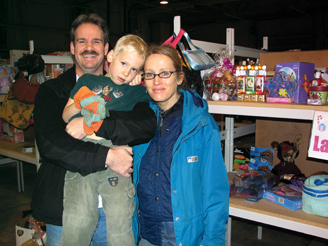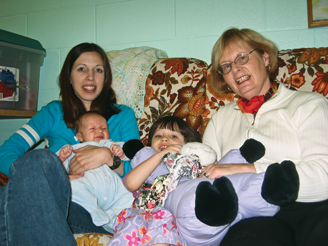
Life doesn’t often turn out how we expect it to. This can be especially true for parents trying to raise a young family. Imagine each of the following situations:
Having recently immigrated to Canada with your family, you find yourself unable to pay an unusually high heating bill.
As a single mom, you have to tell your children there will be no Christmas presents this year.
As a new parent, you reflect on the poor parenting you experienced growing up and want to make sure you give your child a better experience.
As each of these situations is unique, so too are the stories of each family involved in The Salvation Army’s child and family services ministry in Calgary. But there are also similarities. Feelings of fear and doubt are pervasive. Uncertainty of where to turn and embarrassment at needing help are often present. Those who come to The Salvation Army find compassion, understanding and practical support for their children and the entire family.
A family is much more than a group of individuals living under the same roof. A healthy family is one that encourages and motivates its members to achieve their full potential. At its best, it is a loving support group where individual personalities flourish and sound morals are taught. It is the foundation of our society.
Though each family has the potential to raise children who are healthy and happy, many children grow up to be neither of these. Many children and families face challenges such as severe and chronic poverty, little or no parenting skills and ongoing health and education concerns.
Changing With the Times
The Salvation Army has a long history of responding to families in crisis. One hundred years ago, in 1908, Salvation Army officers in Calgary noticed an increasing number of children whose parents were unable to care for them or who had been abandoned. In response to this heartbreaking trend, a children’s home was opened. Initially it was just big enough to accommodate nine children, but over the next 12 years, a number of moves to larger buildings were necessary to accommodate the growing need for this type of care.
Eventually, thanks to a large donation of land outside the city, a facility opened that could house 107 children and five Salvation Army officers. Residents were able to farm their own food and were largely self-sufficient.
During the Great Depression in the 1930s, the need continued to grow and The Salvation Army eventually became the primary caregiver for 130 children. Following the Second World War, it became evident that more children were struggling with issues of emotional and mental instability, so the Army again changed its approach to minister to those needs.
In the early 1960s, smaller group homes were developed that allowed for more individualized care. Staff worked toward the goal of eventually placing the children in foster homes where they would be loved and nurtured. The Children’s Village, as it was then known, became a short-term residential treatment centre where children could stay until they were able to return to their normal setting. This led to the opening of a small school for students who lived on-site.
As the years rolled by, new methods were developed and various other services were provided as The Salvation Army worked with other funding partners who wanted to make a significant and lasting difference in families struggling to build better futures.
Adapting to New Needs
In more recent years, the Army’s ministry evolved yet again. Thus began the work of the Pregnant and Parenting Support Centre, the Healthy Families Program and Community Support Services.

The Pregnant and Parenting Support Program, open to expectant parents and those already with children, assists new and established families to move from being dysfunctional to functional. Parents develop childrearing skills and basic knowledge related to childhood development. This is made possible by providing emotional support, counselling, parenting groups, workshops or simply the opportunity to socialize and share information with other parents. At the same time, the program helps enhance their understanding of family management skills, encouraging responsible and healthy choices.
Delivered through in-home support for at-risk families with newborn babies, the Healthy Families Program emphasizes family functioning, child development and access to community support and resources. It instills confidence in parents and encourages appropriate growth for children. Families are often referred to The Salvation Army from a public health nurse or their family doctor.
Whether in need of assistance with utilities, rent, food, clothing, income tax preparation, Christmas presents or infant essentials, Community Support Services offers families a hand up. There are back-to-school supplies in September and kids’ winter coats when it’s cold. At Christmastime, there are individually chosen gifts for more than 2,000 families every year. In addition, children who have never gone to summer camp are given the opportunity of attending The Salvation Army’s Pine Lake Camp for one week. As each family seeks support, staff meet with them to determine their level of need, then work to meet that need accordingly.
Addressing Real Concerns
Stress due to financial concerns, poor health, marital problems or a wide range of other factors can have a huge impact on the entire family. Staff at The Salvation Army’s child and family services understand the many concerns families face today and offer services designed to meet individuals at their point of need. They work alongside parents and children, helping them build skills that will be with them for the rest of their lives.
Statistics demonstrate that families find the support extremely helpful. The majority who use the Army’s services successfully reach the point where they no longer require assistance. It is these success stores that keep the program staff motivated.
Over the past 100 years, The Salvation Army’s child and family services have offered a way to support growth and strength in children and their families. Programs have evolved in response to community needs and to meet codes of best practice in the social-services field. Today, each unique ministry works to alleviate other symptoms of poverty and dysfunction and prevent homelessness among those who are most vulnerable.
Almost everyone who has raised a child understands that sometimes families need support as they work to give their children the strength, knowledge and character they will need to survive and be the best that they can be.
The Salvation Army will always be available to work with families and children who are in need. Whether it’s fighting to prevent homelessness, keep families together or teach new skills, the Army’s ongoing ministry in Calgary will continue giving hope today—and every day—to those who need it most.
Top photo: A family volunteers at the Christmas assistance warehouse; bottom: Mothers often bring their children to the drop-in times at the Pregnant and Parenting Support Centre.